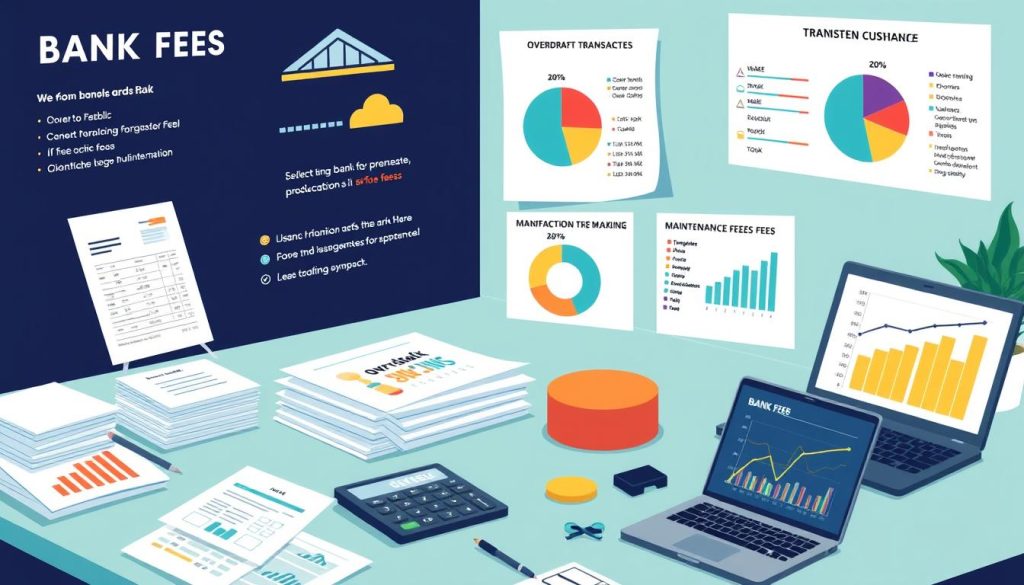UK entrepreneurs looking to grow in America need to grasp business banking here. This guide makes the American banking world easier to understand. It offers key insights and practical tips for British business owners.
Knowing the details of American banking is crucial for your US success. This guide helps you smoothly enter the US market. It gives you the banking knowledge to succeed.
Understanding the American Banking Landscape

The American banking system is complex, with rules from both the federal and state levels. The Federal Reserve is key, acting as the central bank and guiding monetary policy. It makes sure banking rules are followed and the financial system stays stable.
Many types of banks exist in the US, like commercial banks, credit unions, and savings institutions. Each offers unique services for different clients, from small businesses to big companies. The Federal Deposit Insurance Corporation (FDIC) helps keep deposits safe, building trust in the system.
The banking world is competitive, pushing for better services. Big names like JPMorgan Chase, Bank of America, and Wells Fargo lead the way. They provide a variety of business banking products for entrepreneurs and business owners. Knowing these details helps you understand the American banking scene and make smart choices for your business.
Types of Business Banks in America

The American banking scene has many types of banks for businesses. Knowing about these can help entrepreneurs choose the right one for them.
Community banks serve local areas, offering personal service and building community ties. They have special loan options and are flexible. Businesses wanting to connect with their community might prefer community banks.
Commercial banks are bigger, offering many financial services. They have business loans, treasury management, and more. These banks are good for medium to large businesses looking to grow.
Online banks use technology for efficient banking with lower costs. They offer good fees and interest rates. Entrepreneurs can manage their accounts online, saving time and avoiding branch visits.
Credit unions are not-for-profit, serving specific groups like company employees or community members. They have great loan rates and fees. Small businesses might find them appealing for their personal service and community focus.
Business Banking in America: Key Features

Knowing about business banking is key for entrepreneurs and business owners. Different accounts and loans help manage finances. We’ll look at the main types of accounts and loans for U.S. businesses.
Account Types Available
Businesses in America have many account types to choose from. Each is made for different financial needs. Here are the most common ones:
- Business Checking Accounts: These are for daily money needs. Businesses can deposit, withdraw, and manage funds easily. Banks like Bank of America and JPMorgan Chase offer various options with online and mobile access.
- Savings Accounts: Great for saving for the future or emergencies. These accounts earn interest, helping your money grow over time.
- Merchant Accounts: Needed for businesses that take card payments. These accounts help with credit and debit card transactions. They let businesses grow sales and offer customers easy payment options.
Loan Options for Businesses
Getting capital is vital for business growth. In America, there are many loan options. They help entrepreneurs get funds for various needs. Here are some main choices:
- Business Loans: Banks and financial institutions offer these. They provide big sums for growth, equipment, or working capital.
- Lines of Credit: A flexible option for businesses. It lets you draw funds as needed up to a limit. You only pay interest on what you use, making it good for cash flow management.
- SBA Loans: Guaranteed by the Small Business Administration (SBA). They help small businesses get financing with lower rates and longer terms. They’re great for new businesses.
Selecting the Right Bank for Your Business

Choosing a bank is a big decision for any entrepreneur. There are many banking services out there. It’s important to pick one that fits your business needs.
Things like banking fees, customer support, and account features matter a lot. Knowing these can help you make a better choice.
Factors to Consider
When looking at banks, think about these points:
- Customer Support: Find banks with good customer support. Quick help can be a big time-saver.
- Banking Fees: Check out the fees for different accounts and services. These can impact your costs.
- Account Features: Look at what each bank offers. This includes things like transaction limits, interest rates, and how easy it is to use.
- Online Services: Today, good online banking is key. Make sure the bank has a reliable digital platform.
Evaluating Bank Services
Also, look at the extra services banks offer to help your business grow. Important ones include:
- Credit Services: Having access to credit can be crucial for funding.
- Advisory Services: Banks often provide advice on managing finances and planning for the future. Choose banks that offer personalized advice.
- Online Banking Capabilities: A good online banking system is essential for managing money and keeping track of transactions.
Setting Up a Business Bank Account

Opening a bank account for your business is key to a professional financial setup. Knowing the banking needs makes the process easier. You need to meet legal requirements to show your business is real. We’ll cover the steps to open a bank account and what documents you’ll need.
Requirements for Account Opening
When you want to open a bank account, there are rules to follow. These rules protect the bank and the business owner. Here are the main things you need:
- Personal identification, like a passport or driver’s licence.
- Company registration papers to show your business is legal.
- A tax ID number from the IRS or your local authority.
Documentation Needed
There are specific documents you’ll need to prepare for opening an account. Banks usually ask for these:
- Articles of Incorporation or similar documents to prove your business is set up.
- Operating agreements that explain how your company works.
- Identification for anyone who will be on the account.
Having these documents ready makes opening a business bank account easier. It helps you follow the banking rules and start your banking relationship smoothly.
Understanding Fees and Charges

When you deal with business banks in America, knowing about bank charges is key. These charges can really affect your profits. This part explains common bank fees and offers tips on managing costs.
Common Bank Fees Explained
Business bank accounts have many fees that can cut into your profits. Main bank charges include:
- Monthly account maintenance fees that cover the upkeep of account services.
- Transaction fees applied for processing payments, which can add up over time.
- Withdrawal fees incurred when cash is taken out, especially at non-network ATMs.
- Overdraft charges for accounts that go into negative balance territory.
Knowing about these fees helps businesses make better financial choices.
Ways to Minimise Banking Costs
There are ways to cut down on banking costs. Here are some practical steps:
- Negotiating fees with your bank to get lower transaction or maintenance costs.
- Using online banking apps to manage transactions and avoid some fees.
- Picking account types that fit your business’s financial needs to avoid unnecessary charges.
By following these tips, businesses can lower their banking costs. This helps them save money without losing good banking services.
Loans and Credit Options for Businesses

Getting the right funding is key for any business looking to grow or get through tough times. It’s important to know about the different loans and credit options out there. This section will give you a rundown of the various financing choices, including how to get credit and secure funding.
Types of Business Loans
In the United States, businesses can choose from several loan types, each suited for different needs and financial situations. The main categories are:
- Secured Loans: These need collateral, like property or equipment. They usually have lower interest rates because lenders take less risk.
- Unsecured Loans: These don’t need collateral. Without collateral, they often have higher interest rates and stricter rules to qualify.
- Microloans: Made for small businesses, microloans have smaller amounts and are often backed by non-profits. They’re perfect for startups needing a little cash.
- Commercial Loans: This group includes various loans for business needs, like big investments, buying real estate, or covering daily costs.
Interest Rates and Terms
The cost of borrowing can change a lot, based on several things. Interest rates often depend on the borrower’s credit score, the economy, and the loan’s terms. Businesses should think about these points when looking at financing:
- Credit Scores: Better credit scores usually mean better interest rates and terms.
- Economic Conditions: The economy’s ups and downs can change interest rates, often making them higher when times are uncertain.
- Repayment Terms: These set how long you have to pay back the loan. They can greatly affect the total cost of funding.
Regulatory Environment for Business Banking

The rules for business banking in America are strict. They help keep banks safe and sound. Agencies like the Office of the Comptroller of the Currency (OCC) and the Financial Industry Regulatory Authority (FINRA) enforce these rules. It’s key for businesses to know these rules well.
Banks must follow strict rules to stay legal. This builds trust with customers and fair competition. They do this by reporting, auditing, and watching their money moves closely. Banks must also follow federal laws on things like stopping money laundering and protecting customer data.
Watching over banks is crucial for their health. Good rules and controls help banks deal with risks and challenges. This helps banks and the whole economy stay strong, making it easier for businesses to grow.
The Role of Technology in Business Banking

Technology is changing business banking in America. It makes things more efficient and improves how businesses work. Digital banking platforms offer solutions for smoother financial operations and better communication.
Online Banking Solutions
Online banking has changed how businesses handle their finances. Services like e-banking let companies manage their accounts online easily. Banks like Ally and Chime offer features for businesses, including batch payments and financial insights.
Mobile Banking Innovations
Mobile banking apps are key for businesses today. Banks like Citibank and Wells Fargo have created apps with useful features. These include mobile deposits, spending alerts, and strong security to keep information safe.
International Business Transactions

In today’s world, global banking makes international business easy. But, it also brings its own set of rules. Companies trading across borders face challenges like currency exchange and managing risks. This part will look at how to make international payments smooth and how to handle currency risks.
Currency Exchange Considerations
International deals mean watching currency exchange rates closely. Fluctuations can affect your business. Here are key points for managing currency risks:
- Know how exchange rates change your prices and profits.
- Use forward contracts to secure rates and avoid currency risks.
- Keep an eye on market trends and news that can change rates.
- Work with banks that offer good advice on currency risk management.
Transferring Funds Abroad
There are many ways to send money overseas. Knowing your options can make international payments easier:
- Wire transfers: A fast way to send money electronically, great for big deals.
- Remittance services: Services like Western Union and PayPal make quick payments, but watch out for fees.
- Foreign currency accounts: Having accounts in different currencies makes transactions simpler and saves on conversions.
Managing Cash Flow with Business Banking

Effective cash flow management is key to a business’s success. It means keeping track of money coming in and going out. This ensures the business has enough money to pay bills and invest in the future.
By using strong financial planning, businesses can handle their money well. They can meet today’s needs and plan for tomorrow’s growth.
Tools for Cash Flow Management
Using cash flow tools can make managing money easier for businesses. There are many budgeting software options out there. They help with financial planning and setting budgets.
QuickBooks and Xero are popular choices. They help track and predict cash flow. This ensures businesses stay liquid and make smart decisions.
Understanding Cash Reserves
Having enough cash reserves is crucial for any business. Cash reserves act as a safety net for unexpected costs. They help keep operations running smoothly, even when things get tough.
Figuring out how much cash reserve a business needs is important. It depends on ongoing expenses and potential emergencies. Experts suggest building emergency funds based on detailed financial forecasts. This keeps a business strong, no matter the economic conditions.
Resources for UK Entrepreneurs

UK entrepreneurs looking to grow in America have many resources at their disposal. These resources help them understand and grow in the market. There are many networking opportunities, from trade fairs to specific industry events, to make connections and partnerships.
Networking Opportunities
Business networking is key for UK entrepreneurs. Events and trade fairs offer chances to meet potential partners and clients. The UK Trade & Investment agency organises events that bring UK and American businesses together. Some notable events include:
- Annual British American Business Council networking events
- Sector-specific trade fairs
- Business exhibitions open to international participation
Support Organisations and Associations
Many support organisations and trade associations help entrepreneurs. They offer guidance and resources specific to their needs. Key ones include:
- Federation of Small Businesses, offering wide-ranging business support
- British Chamber of Commerce, focusing on trade relationships
- Government resources for new businesses
By using these resources and joining business networks, UK entrepreneurs can tackle the challenges of business banking. They can establish a strong presence in the American market.
Common Challenges in Business Banking

Dealing with the American banking system can be tough for businesses of all sizes. Business owners often struggle with complex fees, compliance issues, and getting loans. Many entrepreneurs get confused about the compliance measures needed, making banking harder.
Navigating Regulatory Compliance
Understanding regulatory compliance is a big challenge for businesses today. Compliance issues are linked to legal matters, leaving business owners unsure of their duties. Here are some key aspects of regulatory compliance:
- Familiarising with local, state, and federal regulations
- Maintaining accurate records for audits
- Implementing comprehensive risk management practices
Business owners often face compliance measures that need careful attention. They worry about the consequences of not following rules, which can result in heavy penalties. Working with compliance experts can offer valuable advice. It helps ensure a smoother banking experience and avoids legal problems.
Future Trends in Business Banking
The world of business banking is changing fast, thanks to new banking trends. Fintech solutions are making banking better and easier for everyone. They offer services that fit each customer’s needs, which is a big part of the change.
Banks are now focusing more on what customers want. They use AI and machine learning to give better advice and predictions. Keeping up with rules is also key to keep customers safe and happy.
The future of fintech will bring new and exciting products to the market. When banks and fintech work together, they create better services for everyone. This change is important for everyone involved to understand and adapt to.

